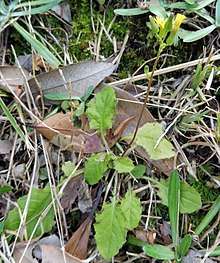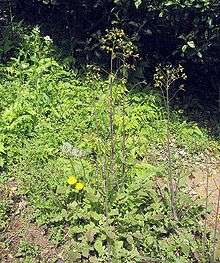Youngia japonica
Youngia japonica, commonly called Oriental false hawksbeard,[1] is a species of flowering plant in the aster family. Native to eastern Asia, it is now found as a weed nearly worldwide.
| Youngia japonica | |
|---|---|
 | |
| A small wild specimen of Y. japonica in Japan | |
| Scientific classification | |
| Kingdom: | Plantae |
| Clade: | Tracheophytes |
| Clade: | Angiosperms |
| Clade: | Eudicots |
| Clade: | Asterids |
| Order: | Asterales |
| Family: | Asteraceae |
| Genus: | Youngia |
| Species: | Y. japonica |
| Binomial name | |
| Youngia japonica | |
Description
It is an annual that produces yellow flowers. In tropical areas, it can bloom year round, while in temperate areas it blooms in late spring and early summer.[2] Plants are variable in height, ranging from 10 to 150 cm (4 to 59 in) depending on growing conditions. Stems are usually solitary and erect. Basal leaves are large a pinnately divided. Its fruits are wind dispersed.[3]
 Youngia japonica grows tall under favorable conditions
Youngia japonica grows tall under favorable conditions
Distribution and habitat
Youngia japonica is native to eastern Asia in China and Japan.[3][4] However, it has been spread far from its initial range, and is now found as a non-native species nearly worldwide. It is present in Africa, Australia, Europe, North America, and South America.[2] In the United States, it is spreading rapidly, although it is largely restricted to areas in the Southeast.[5][6] It grows well in response to human disturbance, and is found in areas in areas such roadsides, cultivated fields, and in lawns.[2] In China, it is found in a variety of natural and disturbed habitats.[3] It is known to penetrate into intact natural communities as an invasive species in the United States.[5]
Taxonomy
Three subspecies are recognized. They are:[3]
- Y. japonica ssp. elstonii - With many stem leaves. Not known to be weedy.
- Y. japonica ssp. japonica - With few to no stem leaves. A weed found nearly worldwide.
- Y. japonica ssp. longiflora - Has larger flowers. Not known to be weedy. This is considered the most distinct subspecies.
It has been reported to form intergeneric hybrids with Lapsanastrum humile in Japan.[4]
References
- "Youngia japonica". Natural Resources Conservation Service PLANTS Database. USDA. Retrieved 8 January 2018.
- Flora of North America, Youngia japonica
- Flora of China, Youngia japonica
- Ohwi, Jisaburo (1965). Flora of Japan. Smithsonian Institution. p. 930.
- Alan Weakley (2015). "Flora of the Southern and Mid-Atlantic States".
- "Youngia japonica". County-level distribution map from the North American Plant Atlas (NAPA). Biota of North America Program (BONAP). 2014. Retrieved 8 January 2018.